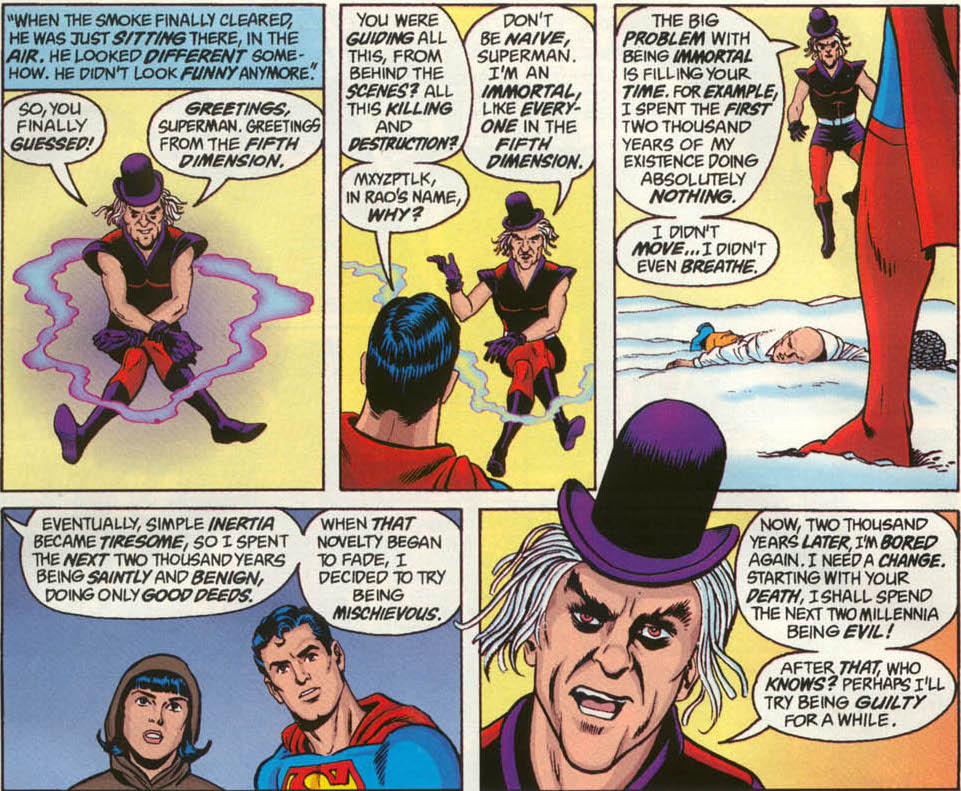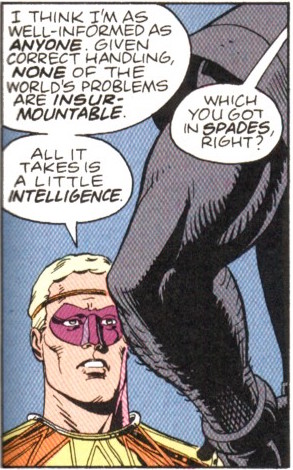“Anybody could have done it.” (The Last War in Albion Book Two Part Fourteen: Before Watchmen: Rorschach)
Previously in The Last War in Albion: Perhaps surprisingly given his pedigree as a creator, Brian Azzarello’s two contributions to the Before Watchmen line were largely disappointing and unoriginal. The first, Before Watchmen: The Comedian, frames the charater largely in terms of the Kennedies, essentially opening with the assassination of JFK and closing with that of RFK, committed by the Comedian to cover a war crime he committed in Vietnam.
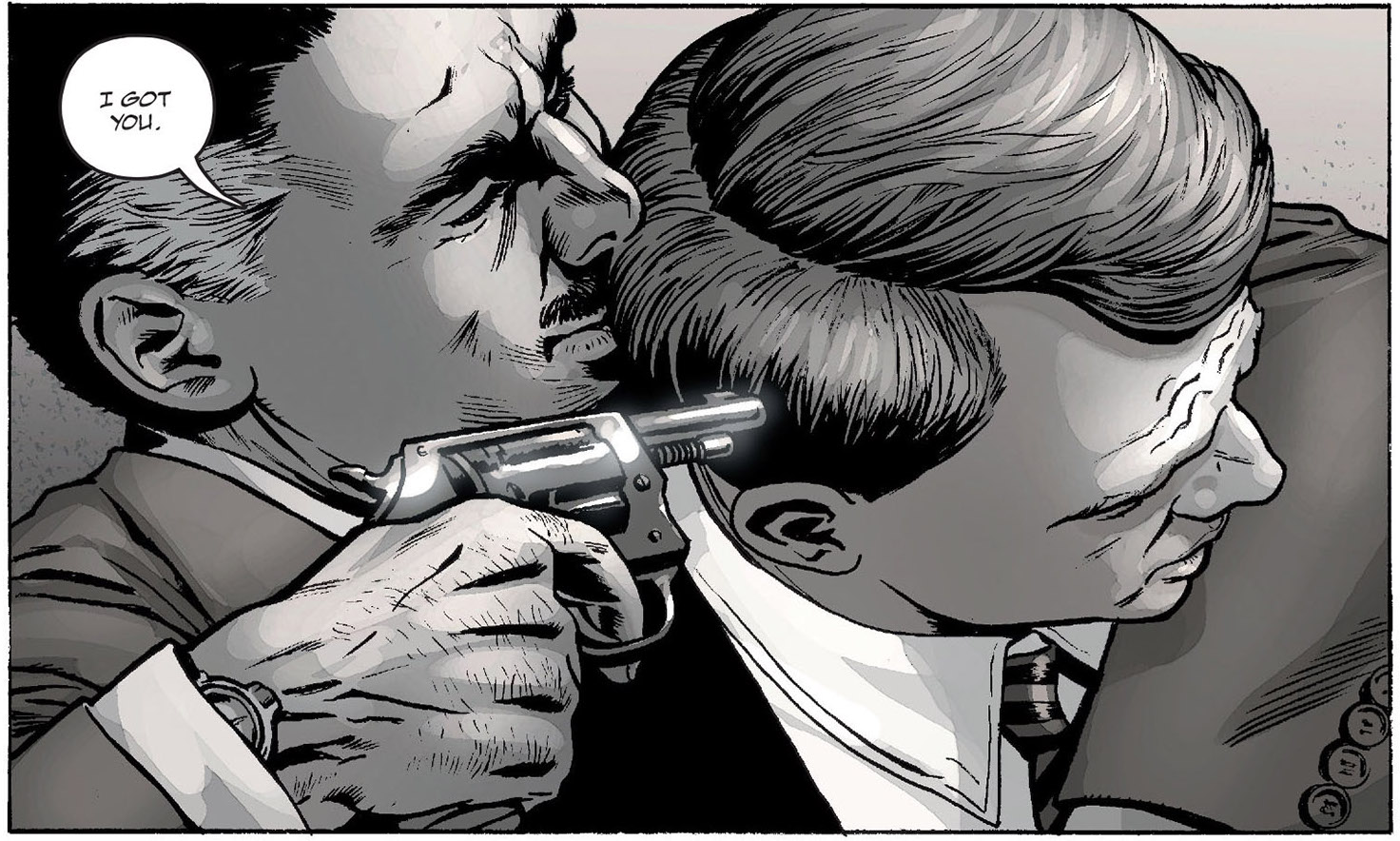 |
| Figure 895: The Comedian assassinates Bobby Kennedy. (Written by Brian Azzarello, art by J.G. Jones, from Before Watchmen: The Comedian #6, 2012) |
It would be overstating the case to say that Azzarello simply allies the Comedian with Kennedy-style New Frontier liberalism: the ending makes that a hard sell, after all. Rather, it’s that Azzarello uses the two Kennedy assassinations as the poles in a fairly traditional account of the decline of 1960s leftist idealism, from JFK’s death as a tragedy that stuns the Comedian to RFK’s death as the Comedian’s own doing, with the engine of that transition being the Vietnam War. Azzarello does not do anything so crass as suggest that the Kennedys are some sort of unalloyed good, of course. He portrays them in line with the historical reality of their considerable corruption. But their corruption is ultimately paralleled with the Comedian’s; he even refers to Robert Kennedy as a “way more effective” crime fighter than he is at one point. They’re all of a type; the sort of morally compromised hard men who flooded superhero comics in the wake of The Dark Knight Returns, and that Watchmen is so often misunderstood as being about. This is even echoed in the art; J.G. Jones, doing his first significant interior work since his awkward exit from Final Crisis three years earlier, imbued the series with what Azzarello called a “masculine realism,” framing this sense of masculinity as central to the Comedian’s character.
This is, to say the least, a bizarre take on the Comedian. Over and over again Watchmen stresses that the Comedian is essentially a nihilist; he understood the same existential darkness that Rorschach did, and, as Rorschach puts it, “chose to become a reflection, a parody” of the fundamentally dysfunctional and broken world. Unlike Rorschach’s absolute belief in justice, however, the Comedian was fundamentally amoral, ultimately driven only by a desire to be tougher than the world (hence his ultimate breakdown when he realizes that Ozymandias’s pragmatic nihilism vastly exceeds his own). Simply put, he’s almost fundamentally impossible to use as the symbol of any sort of idealism, even one in terminal decline. Azzarello’s character, who sulks that “the one thing – the abso-fucking-one thing that no one ever got about me is that I am a patriot” is, in this regard, virtually unrecognizable. As for the idea that the Comedian represents some sort of masculine ideal at any point in his career, it’s difficult to see where this comes from within Watchmen, where one of the first things established about the character is the fact that he raped the Silk Spectre.…

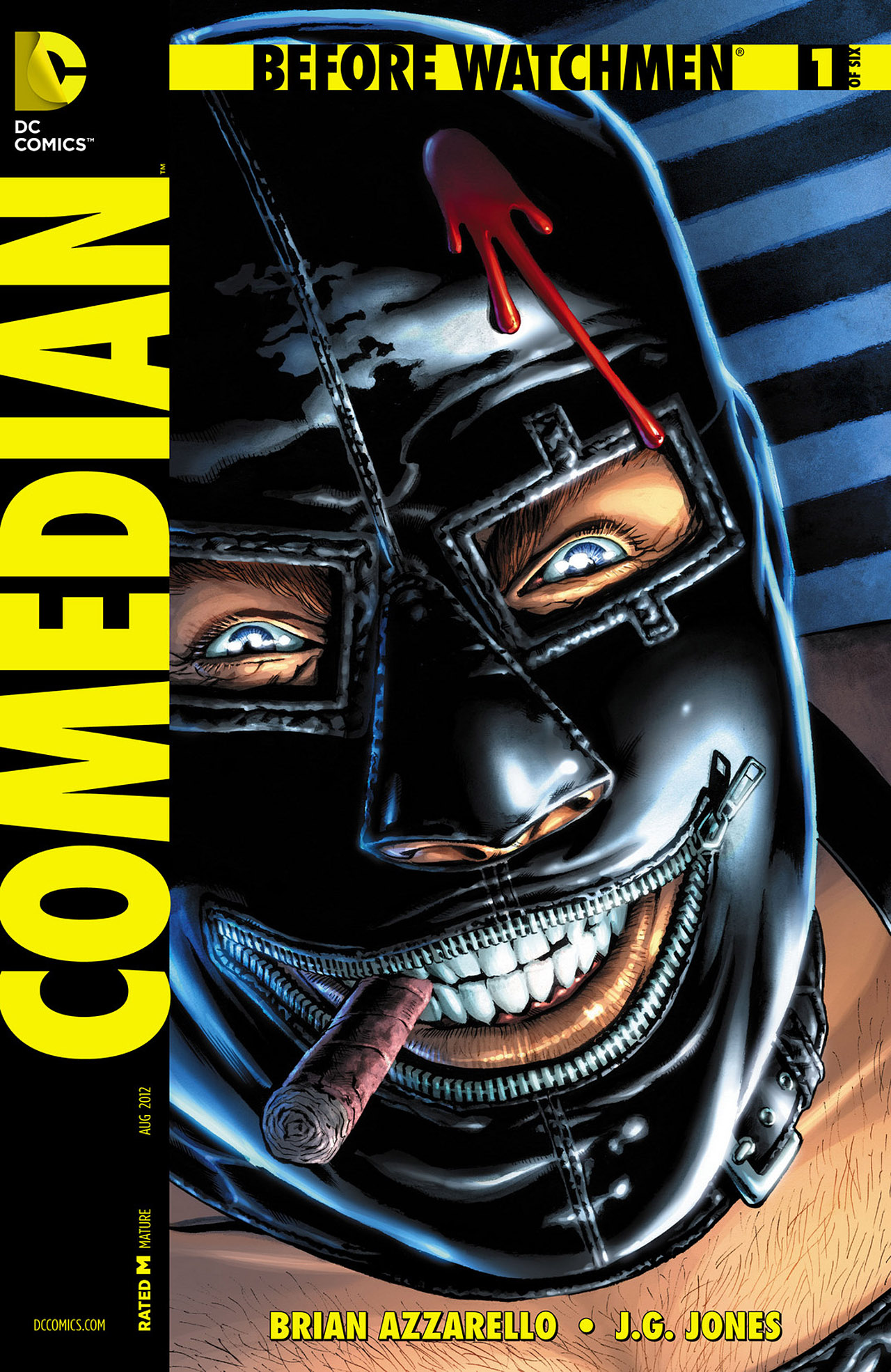 Previously in The Last War in Albion: Alan Moore and Grant Morrison’s differences of opinions are numerous, but one of the most fundamental differences comes in their relationship to the atomic bomb. Both were profoundly concerned with nuclear warfare, but for Morrison it was a childhood fear he found respite from in superheroes, whereas for Moore it was an adult concern he worked through using superheroes as a metaphor.
Previously in The Last War in Albion: Alan Moore and Grant Morrison’s differences of opinions are numerous, but one of the most fundamental differences comes in their relationship to the atomic bomb. Both were profoundly concerned with nuclear warfare, but for Morrison it was a childhood fear he found respite from in superheroes, whereas for Moore it was an adult concern he worked through using superheroes as a metaphor.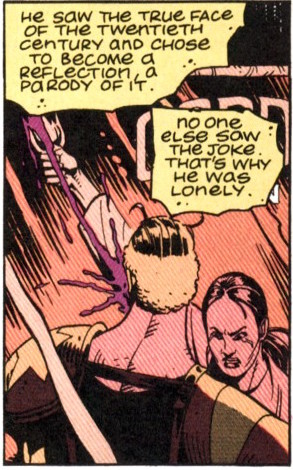 Arguably, then, this forms one of the few major chinks in Moore’s usually resilient armor of eternity – a point on which Moore can decisively and unambiguously be said to have changed. And yet it is easy to overstate this. Moore’s revulsion towards Watchmen is genuine, and yet it is not really a revulsion at the work itself. Rather, it is a revulsion at the world that Moore used Watchmen to look at – one that he found monstrous and twisted, and wrongly assumed that the rest of the world would see it that way as well. This is not just a matter of the fans who seized onto Rorschach in ways Moore found disturbing, but rather the entire way in which the nightmarish world he constructed, in which superheroes were the embodiment of humanity’s most self-destructive impulses tragically deluding themselves into believing that they were the world’s Watchmen and not its doom, was treated as something desirable.…
Arguably, then, this forms one of the few major chinks in Moore’s usually resilient armor of eternity – a point on which Moore can decisively and unambiguously be said to have changed. And yet it is easy to overstate this. Moore’s revulsion towards Watchmen is genuine, and yet it is not really a revulsion at the work itself. Rather, it is a revulsion at the world that Moore used Watchmen to look at – one that he found monstrous and twisted, and wrongly assumed that the rest of the world would see it that way as well. This is not just a matter of the fans who seized onto Rorschach in ways Moore found disturbing, but rather the entire way in which the nightmarish world he constructed, in which superheroes were the embodiment of humanity’s most self-destructive impulses tragically deluding themselves into believing that they were the world’s Watchmen and not its doom, was treated as something desirable.…_001-001.jpg)
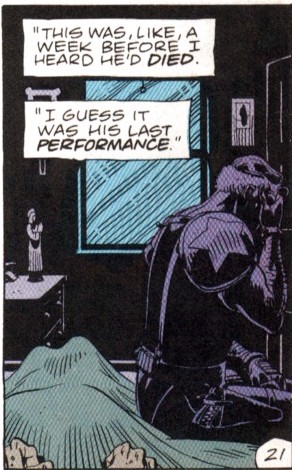 – indeed, Morrison had been hyping it since 2009, describing it as rooted in “that sort of crystalline, self-reflecting storytelling method” and an attempt to capture what would happen “if Alan Moore and Dave Gibbons had pitched the Watchmen now, rooted in a contemporary political landscape, but with the actual Charlton characters instead of analogues.” In this regard, what is perhaps most significant about it is that it is not an imitation of Watchmen as such. Where many comics overtly following from Watchmen adopt its nine panel grid, Pax Americana is based around an eight panel grid, albeit significantly more loosely than Watchmen is around its grid. This is in turn reflected within the comic, which uses the figure eight as a recurring visual motif. But Morrison slyly plays on the image, using it not just to represent the number 8, but as an infinity symbol, a figure that tacitly invokes Doctor Manhattan’s line shortly before the end of Watchmen, “nothing ever ends.”
– indeed, Morrison had been hyping it since 2009, describing it as rooted in “that sort of crystalline, self-reflecting storytelling method” and an attempt to capture what would happen “if Alan Moore and Dave Gibbons had pitched the Watchmen now, rooted in a contemporary political landscape, but with the actual Charlton characters instead of analogues.” In this regard, what is perhaps most significant about it is that it is not an imitation of Watchmen as such. Where many comics overtly following from Watchmen adopt its nine panel grid, Pax Americana is based around an eight panel grid, albeit significantly more loosely than Watchmen is around its grid. This is in turn reflected within the comic, which uses the figure eight as a recurring visual motif. But Morrison slyly plays on the image, using it not just to represent the number 8, but as an infinity symbol, a figure that tacitly invokes Doctor Manhattan’s line shortly before the end of Watchmen, “nothing ever ends.”_001-002.jpg)
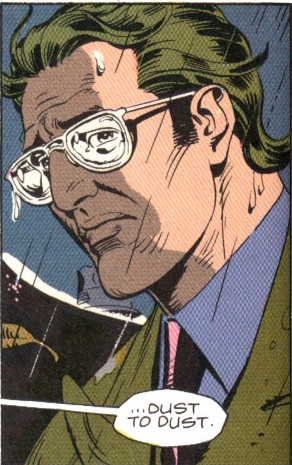 This also helps explain how Watchmen relates to what was, by the mid-80s, a significant body of revisionist takes on superheroes. The most obvious point of comparison here is Frank Miller’s Batman: The Dark Knight Returns, which came out from March to June of 1986, with the final issue coming a week after the first issue of Watchmen. The proximity of the two nuclear paranoia-fueled revisionist tales of aging superheroes, along with a wealth of news articles that cited them, along with Art Spiegelman’s Maus as heralding a new, mature era for comics (usually, as famously noted by Neil Gaiman, carrying titles along the lines of “Zap! Pow! Comics Aren’t Just for Kids Anymore!”), made them obvious bedfellows, an impression heightened by the fact that Moore and Miller were critical darlings among the same crowds.
This also helps explain how Watchmen relates to what was, by the mid-80s, a significant body of revisionist takes on superheroes. The most obvious point of comparison here is Frank Miller’s Batman: The Dark Knight Returns, which came out from March to June of 1986, with the final issue coming a week after the first issue of Watchmen. The proximity of the two nuclear paranoia-fueled revisionist tales of aging superheroes, along with a wealth of news articles that cited them, along with Art Spiegelman’s Maus as heralding a new, mature era for comics (usually, as famously noted by Neil Gaiman, carrying titles along the lines of “Zap! Pow! Comics Aren’t Just for Kids Anymore!”), made them obvious bedfellows, an impression heightened by the fact that Moore and Miller were critical darlings among the same crowds.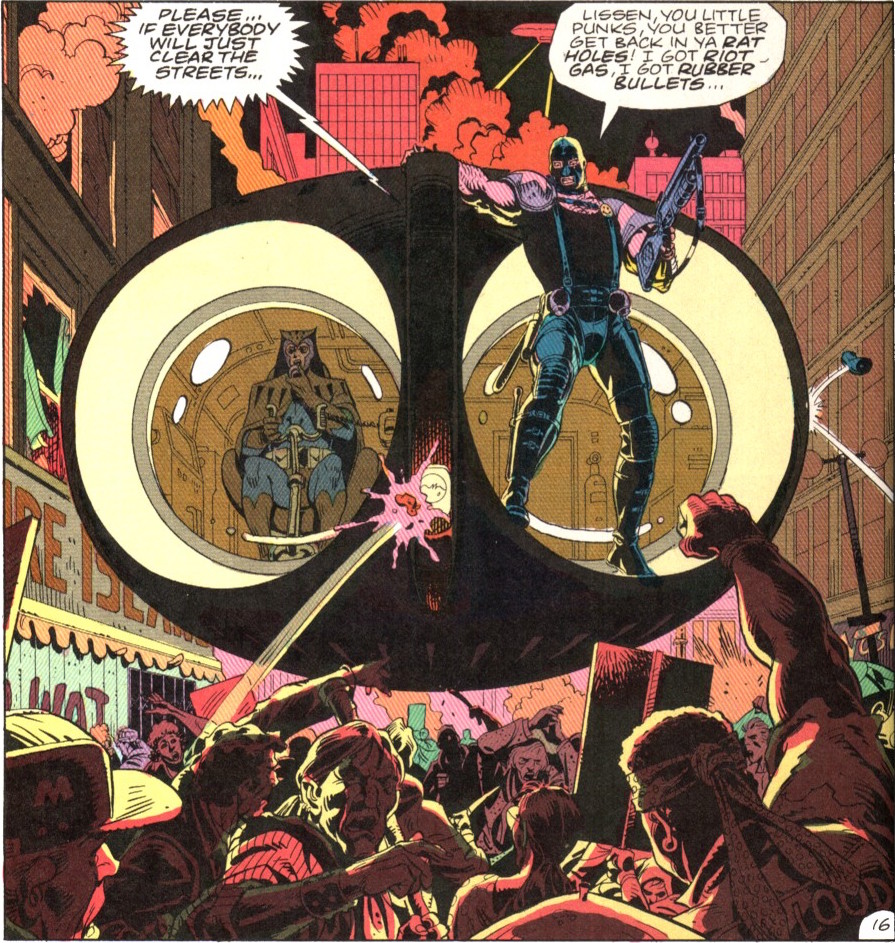 Moore was also a vocal proponent of Miller’s work, and had been since 1983, when he wrote an essay in The Daredevils praising and analyzing the Miller Daredevil run whose reprints headlined the magazine. (He also, of course, wrote “Grit,” a parody of Miller’s Daredevil work, for the same magazine.) Indeed, he wrote the introduction to the first trade paperback edition of The Dark Knight Returns, calling it “one of the few genuine comic book landmarks worthy of a lavish and more durable presentation.” And indeed, the work is a perennial bestseller and a landmark work, although its status as a classic has, in recent years, found itself endangered by a larger shift in Miller’s critical reception brought on in part by his unfortunate late career turn towards crass Islamophobia in works like Holy Terror and his tendency to do things like call the 2011 Occupy protests “a pack of louts, thieves, and rapists” due to their failure to sufficiently oppose radical Islam. And indeed, More has been a part of that turn, proclaiming in 2011 that “Frank Miller is someone whose work I’ve barely looked at for the past twenty years” before going on to criticize the majority of Miller’s work from that period, and suggesting, of his Occupy criticism, that “if it had been a bunch of young, sociopathic vigilantes with Batman make-up on their faces, he’d be much more in favour of it.”
Moore was also a vocal proponent of Miller’s work, and had been since 1983, when he wrote an essay in The Daredevils praising and analyzing the Miller Daredevil run whose reprints headlined the magazine. (He also, of course, wrote “Grit,” a parody of Miller’s Daredevil work, for the same magazine.) Indeed, he wrote the introduction to the first trade paperback edition of The Dark Knight Returns, calling it “one of the few genuine comic book landmarks worthy of a lavish and more durable presentation.” And indeed, the work is a perennial bestseller and a landmark work, although its status as a classic has, in recent years, found itself endangered by a larger shift in Miller’s critical reception brought on in part by his unfortunate late career turn towards crass Islamophobia in works like Holy Terror and his tendency to do things like call the 2011 Occupy protests “a pack of louts, thieves, and rapists” due to their failure to sufficiently oppose radical Islam. And indeed, More has been a part of that turn, proclaiming in 2011 that “Frank Miller is someone whose work I’ve barely looked at for the past twenty years” before going on to criticize the majority of Miller’s work from that period, and suggesting, of his Occupy criticism, that “if it had been a bunch of young, sociopathic vigilantes with Batman make-up on their faces, he’d be much more in favour of it.” 
